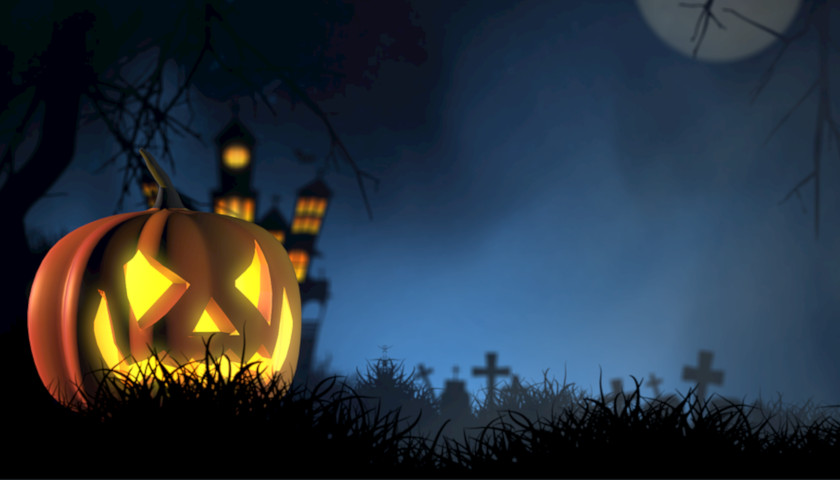by Jeffrey A. Tucker
When I was a kid, Halloween was for kids only. Adults were there to hand out candy — and monitor the kids to make sure we weren’t enjoying the culture of ghosts, ghouls, and goblins too much. That would be dabbling in evil, and our souls might be corrupted. My mom, for example, banned fake blood from the house. At the age of 15 or so, your Halloween fun was expected to be over.
Times have dramatically changed. Now it’s for everyone. Costume shops are open all year, and do fabulous business in October. Parties are everywhere. Houses are decorated, and even apartment doors. The local CVS has several aisles dedicated to scary, creepy, delightful, sweet things for this holiday.
The National Retail Federation reports that 157 million Americans will celebrate it, and 4 in 5 millennials will arrange or attend special parties. Spending will approach $7 billion, with the average person spending $74 on stuff for the holiday. This is doesn’t yet rival Christmas but it could soon become more economically significant as Easter.
Of course the roots of Halloween are pagan, but after these days were Christianized and put into the liturgical calendar (All Saints and All Souls), they really were for everyone. All of Europe and Latin America had huge festivals just like what we are experiencing today. So what we are seeing is not some kind of corruption but a fulfillment of holiday’s destiny.
But notice that Halloween doesn’t appear on the official national calendar, which includes stuff that barely registers on people’s radar, like Labor Day and Presidents Day. That hasn’t stopped Halloween from rising ever higher in cultural significance.
Why has this happened?
Individualism. Halloween is all about what you will do, who you will become, what choices you will make. In that sense, this day affirms the great truth that only individuals act, only individuals think, only individual decision making causes history to happen.
This truth runs counter to myriad claims of the right and left, from time immemorial, that somehow large collectives are the essential actors of life and history. And it contradicts the claims of modern politics that we are nothing until we band together, lose our identities, and move en masse.
Creativity. There are no limits to what you can do and what you can become on Halloween because there is no script and no plan. The day calls on people to create their own identity and make their own choices. This is a welcome relief given our ridiculously regimented social and economic systems, in which bureaucrats, regulations, and plans rule over all. The best part is the surprise and delight that comes with such an open-ended systems. Halloween calls on the entrepreneur and inventor within all of us, and gives us an opportunity to express it.
Breaking Bad. Politicians and policemen, and all sorts of authority figures in society, are constantly proclaiming themselves our guardians in order to keep us safe from terrible things. Danger is everywhere, we are told, and we are not competent to combat it on our own. Drugs, terrorism, piracy — these are terrible things. To be safe is why we must submit and comply.
The beauty of Halloween is that it rejects this whole paradigm. It embraces danger and impiety as part of life, affirming people’s capacity to deal with it on their own. It’s a holiday that affirms our adulthood. There is a liberation that comes with the choice to embrace mischief without asking permission. Even the love of candy — which the ruling class has demonized as unhealthy and deviant — symbolizes the rejection of authority. It’s the ultimate repudiation of puritanism.
Chaos. Where to go and what to do on Halloween? There was a time when there was only one choice: collecting candy door to door. Now, anything can happen, anywhere. Every bar in town will have celebrations, but there will be millions of private parties too. It’s a time for doing the unexpected and watching a beautiful order emerge as a result. It’s a time for spontaneity and for taking joy in how, somehow, it all works in the end. Halloween taps into our inner social scientist and underscores how unplanned chaos can create a beautiful order.
Fun. The more the political elites try to control life, the less fun it becomes. Just look at the dreadfulness of the recent presidential debates. Everyone is so stern and serious all the time. Such is the nature of systems of control: they drain the fun out of life. Have you ever had an interaction with a politician or bureaucrat that was delightful?
Halloween is the opposite. It encourages everyone to unleash that part of our nature that loves to laugh, to scream, to be silly, to have fun, and, above all else, to be free of strictures and mandates. It a one day liberal utopia.
For these reasons, Halloween has taken on a life of its own. Its cultural significance keeps rising because it presents an alternate paradigm of the way life can be. It affirms individualism, creativity, danger, chaos, and fun as integral features of a life well lived. No one planned it this way, but no one can stop the delightful revolt against the status quo that Halloween represents.
– – –
Jeffrey Tucker is a former Director of Content for the Foundation for Economic Education. He is the Editorial Director at the American Institute for Economic Research, the founder of Liberty.me, Distinguished Honorary Member of Mises Brazil, economics adviser to FreeSociety.com, research fellow at the Acton Institute, policy adviser of the Heartland Institute, founder of the CryptoCurrency Conference, member of the editorial board of the Molinari Review, and author of five books.




